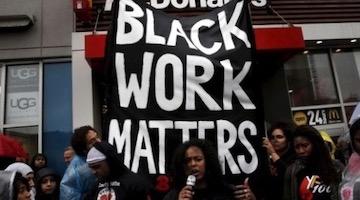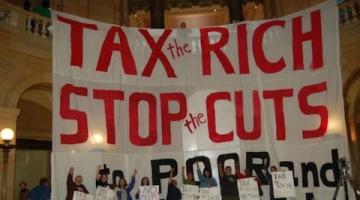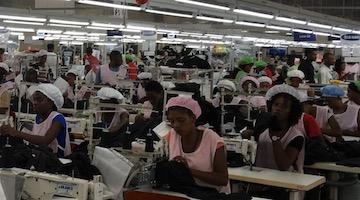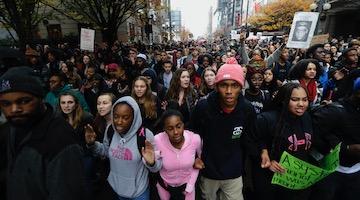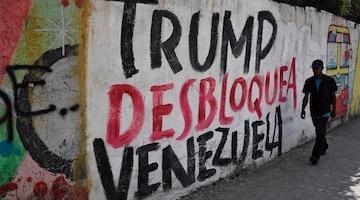The Capitalist Crisis Has Made the U.S. a Pariah State
U.S. imperialism has nothing left to offer humanity but ecological destruction, endless war, and a decline in living standards domestically and globally.
“There would be no endless wars for profit without the enslavement of Africans.”
Capitalism, even of the U.S.’ so-called “exceptional” variety, is characterized by cyclical crises that occur every ten or so years. Marxist theorists attribute the emergence of capitalist crises to the always sharpening contradiction between labor and capital. The more profit that capitalists extract from labor, the more impoverished labor becomes. Eventually, workers become so impoverished that entire sectors of capitalist production ground to a halt. This process is generally called overproduction but is better termed underconsumption. In a frenzy to shed costs and maintain profits, capitalists engineer massive layoffs, wage freezes, and other measures that intensify the precariousness of the masses.
Two developments are principally responsible for nursing the capitalist system back to recovery. Capitalist crises inspire workers to organize and demand concessions from the ruling class. Capitalist themselves search for new markets by waging wars to boost production. A combination of worker-led resistance and military-based capitalist production brought the United States out of the Great Depression by the end of World War II. However, in a little over three decades, the U.S. capitalist system entered a new stage of development incapable of generating even a modicum of economic recovery for the working class.
“A combination of worker-led resistance and military-based capitalist production brought the United States out of the Great Depression.”
This stage of capitalism has come to be known by many as neoliberalism. Under neoliberalism, the banks and monopolies rule. Neoliberalism is thus the most sophisticated yet most crisis ridden form of imperialism to date. Automation and technological development have fueled corporate mergers and rendered large sections of the working class obsolete. Capitalists have frozen wages, plundered the public sector, and placed all vestiges of public life into the death throes of “the market” to set into motion a race to the bottom. Overproduction has become a permanent fixture of the capitalist system.
The permanency of overproduction has made the U.S. a desperate pariah state, always in search of the most profitable forms of destruction. Wars of aggression have become just as permanent as the economic crisis that engendered them. The U.S. military state has grown exponentially over the course of the last half century and eclipses the next ten nations’ military budgets combined. U.S. Special Forces, known in the world as the mercenary arm of the military state, occupy seventy percent of the world’s nations. The U.S. is the world leader in drone warfare and regularly assists jihadists in their bloody crusade to destabilize independent Arab nations such as Syria and Iraq. Because U.S. imperialism is governed by a racist state, Black and brown people make up the majority of those murdered, imprisoned, and tortured in the capitalist quest to preserve social and economic tranquility by way of military intervention.
“Wars of aggression have become just as permanent as the economic crisis that engendered them.”
New research indicates that neither war nor neoliberal austerity can foster economic recovery for the masses. Wage growth, along with employment, is commonly viewed by even the most reactionary of economists as a key measure in determining whether the capitalist system is on the road to recovery. According to Brookings, wage growth remains non-existent since the economic crisis of 2007-2008. Forty-four percent of all workers in the United States make less than $16 per hour. The study excluded students living in dormitories, graduate students, as well as other sections of the workforce that ran the risk of skewing the data. In other words, there are likely even more workers toiling in the low-wage sectors of capitalism than the results of the study suggest.
The capitalist crisis has made the U.S. such a pariah state for workers that white Americans have become collateral damage in the ruling class’ pursuit of profit. Life expectancy has been falling in the United States since 2014. According to the Journal of the American Medical Association (JAMA), this trend is likely to continue in 2019 and beyond. JAMA connects the spiral downward in life expectancy to a massive die-off of middle-aged white American men from the diseases of despair: suicide, addiction, and chronic medical illness. White American male workers are sicker, poorer, and more prone to self-annihilation than at any other period in U.S. history. While the capitalist crisis has maintained white power in the ruling order, it has chipped away at the material privileges of white male workers who had grown accustomed to receiving a portion of the wealth robbed from Black Americans and Indigenous peoples.
“The capitalist crisis has chipped away at the material privileges of white male workers.”
JAMA leaves out a very important factor in the decline of life expectancy in America. That factor is the rise of the mass Black incarceration state. The U.S. possesses twenty-five percent of the world’s prisoners and just five percent of the world’s population. Research suggests that for every year a person spends in prison, two years are taken from their life expectancy. The United States has lost at least five years of total life expectancy gains due to its obsession with mass incarceration.
Over the last thirty years alone, millions of Black Americans have been imprisoned or ensnared in a system of mass incarceration designed to control an increasingly redundant section of labor. One in three Black men in the United States will go to prison at some point in their lives. Police homicide is now the seventh leading cause of death for young Black men. For as much as the capitalist economic crisis has eroded white privileges, the U.S. remains a white supremacist death trap to its core. Militarized forms of state repression such as the mass incarceration state have been reserved for Black Americans, Indigenous peoples, and the massive numbers of migrants forced to flee from U.S. imperialist treachery in the Americas. These conditions have remained a fixture of the crisis of capitalism but are rarely discussed as such.
“The U.S. remains a white supremacist death trap to its core.”
The crisis of capitalism is a global crisis. Much of the world’s people have long been aware of the parasitic character of the U.S. state. According to a new index of human development, the source of the U.S.’ parasitic character lies in its imperial development model. The U.S. ranks 159th out of 163 nations on the Sustainable Development Index (SDI). The SDI divides gains or losses in the education, income, and life expectancy of a given nation by the ecological footprint left by the country’s course of development. Socialist Cuba topped the list as the most sustainably developed country in the world. Unlike socialist Cuba, the U.S.’ imperialist model of development has always placed the profits of the rich above the needs of workers and the environment. And at its current stage, U.S. imperialism has nothing left to offer humanity but ecological destruction, endless war, and a decline in living standards domestically and globally.
The crisis of capitalism has indeed exacerbated the ills of imperialism, but these ills are foundational and inherent to the U.S. way of life. Finance capital and the post-industrial age of the U.S. Empire could not have come about were it not for the centuries of colonial plunder and racialized terror imposed upon Black and Indigenous lives beginning in the 17th century. Wall Street began as a marketplace for the slave trade. Africans were traded not only as laborers but also as financial instruments that enriched bankers and slave traders alike. Wall Street financiers would go on to intentionally devalue property in Black communities and then target them with fraudulent “ghetto loans” geared toward fleecing Black America of its wealth in the post-Civil Rights era.
“Socialist Cuba topped the list as the most sustainably developed country in the world.”
On this Thanksgiving past, it is also important to note that capitalism itself could not exist without the colonial plunder of Indigenous America. There would be no endless wars for profit without the enslavement of Africans. U.S. imperial capitalism is rooted in the logic of elimination and the dehumanization of entire nations. Too often, neoliberalism and the current crisis of capitalism is described and analyzed on purely economistic terms. This protects white supremacy and renders capitalism a permanent condition rather than a phenomenon bound to a specific historical epoch. Any movement seeking to combat the U.S. pariah state’s capitalist crisis and create a revolutionary situation that can put the entire system to rest must make self-determination a defining principle of its day-to-day work.
Danny Haiphong is an activist and journalist in the New York City area. He and Roberto Sirvent are co-authors of the book entitled American Exceptionalism and American Innocence: A People’s History of Fake News--From the Revolutionary War to the War on Terror (Skyhorse Publishing). He can be reached at wakeupriseup1990@gmail.com, on Twitter @spiritofho, and on Youtube at The Left Lens with Danny Haiphong.
COMMENTS?
Please join the conversation on Black Agenda Report's Facebook page at http://facebook.com/blackagendareport
Or, you can comment by emailing us at comments@blackagendareport.com

